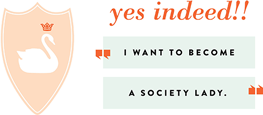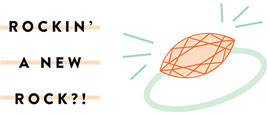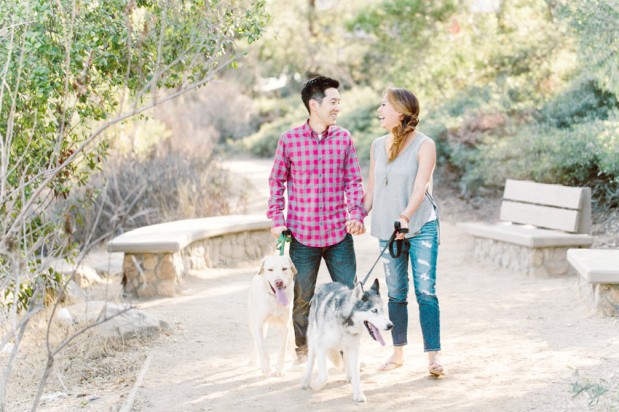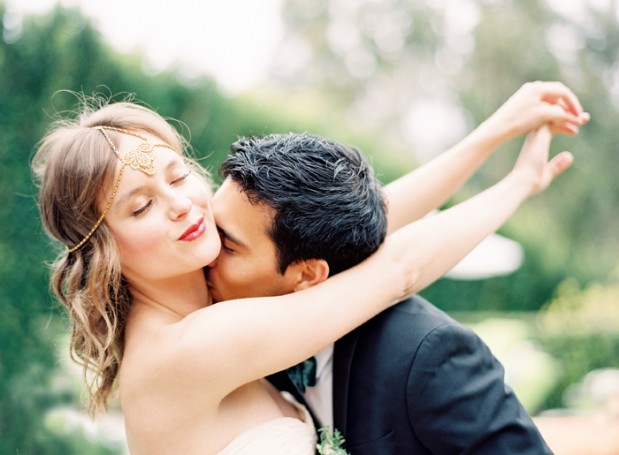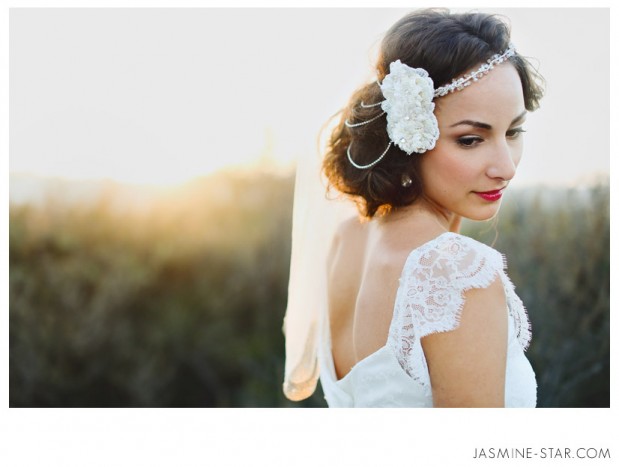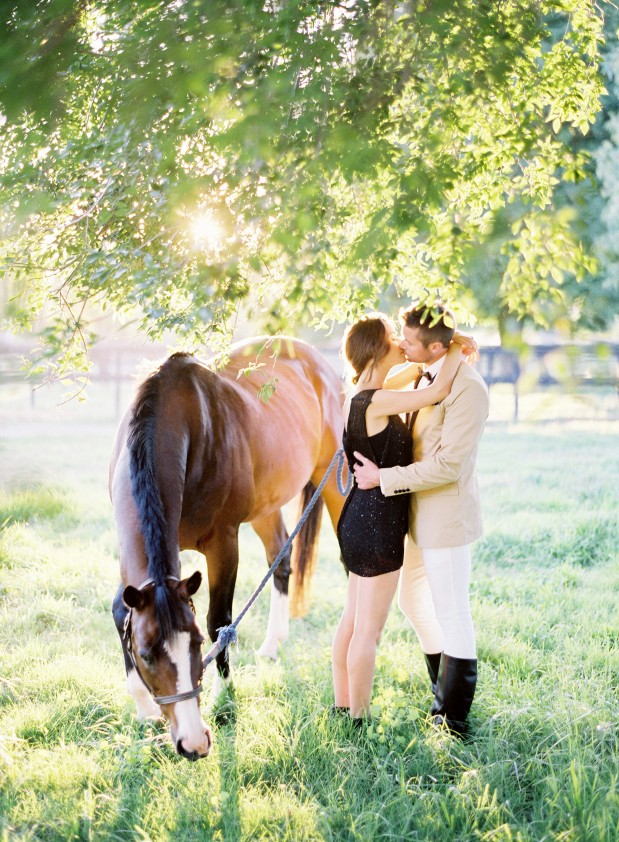Planning Tools:
The Great Film Versus Digital Debate
understanding the difference makes all the difference
First, there was film photography. You know–where they use the kind of camera that doesn't have a screen for sneak peeks on the back? And then came digital and eventually, it seemed like anyone who shot film was old school. (I mean, Kodak sold off their film business). Digital was so fast and snazzy! And then film had a comeback (NY Times even said so) because–ya know–you can't replace the look of film (and we're pretty sure Jose Villa had a little something to do with the resurgence). But with constant advancements in technology and software, digital is battling it out, aiming to accomplish the look and feel of film. That's my super amateur summation of our current status, which is to say: I think you need some more solid info.
These days, because so many wedding photographers are moving back to film photography, it's worth posing the question for brides who don't quite get what all the fuss is about. Film or digital? What's the difference? Why should I care? We took to the streets and asked four prominent photographers, each some of the strongest representatives of their mediums, questions about what format they use and why. Jessica Claire, Jen Huang, Jasmine Star, and Jose Villa (*listed in alphabetical order!) were all gracious enough to answer some questions for me.
I think this is a fabulous survey that underscores some of the differences between film and digital photography from the perspective of the artists themselves. Obviously each photographer is opinionated about the medium they've chosen–and rightly so. What we love is that these answers help us better understand the passion behind their choices (which is probably the type of thing you should be looking for irregardless: a raging sense of passion for their art–something all of these photographers have in spades). For some of you brides, film or digital is not necessarily what you're thinking about when choosing a photographer–you're just choosing someone whose work you love. And while we agree that should be the ultimate deciding factor, we think it's worth chatting about the different mediums. It's no secret that editors love the look of film–and by love I mean, we're totally obsessed. But we're learning that digital has it's own distinctive advantages as well. Our aim here is not to debate which medium is better–but rather to help you figure out which is better FOR YOU!
So are you ready for this? We're presenting the interview answers in alphabetical order and we've included a sample image from each photographer!
Which medium do you use?
Canon digital cameras and mostly prime (fixed focal length) L series (top of the line) lenses
Why?
I've been a professional wedding photographer for almost 15 years. When I first started shooting, I was trained on medium format film cameras. While I love the fact that I have the training and technical skills required, I quickly found that medium format camera gear is heavy and slower to work with at an event as fast-paced as a wedding. Right at the beginning of my career, digital cameras started getting good enough to use at a wedding in that they were able to produce excellent quality prints. However, back then, most people still agreed that the prints were not nearly as good as the results you'd get shooting film. In the last 10 years though, the advances made in digital cameras has been so extreme that the quality of the files is actually better than that of film! And when you take into account that nowadays, even film photographers have their photos scanned to digital files, we're all shooting digital anyway!
What's the difference between the film and digital?
Shooting digitally, there's very little additional cost associated with shooting more photos so there's no gap time in the shooting. Basically, you can afford to shoot first and delete later–you end up with a much bigger selection of images to choose from. This can be a blessing and a curse, as any photographer knows! The time it takes to narrow down to the best if you overshoot can be overwhelming to say the least. When people shoot film, it is so expensive between the film itself and the processing that more thought goes into each photo. It's a process, for lack of a better word.
When people think of film, they think of prints that have a beautiful, rich texture and color. There is also a softness (digital files can be sharper) and a grain with film. However, with the advent of presets such as the new REPLICHROME from Totally Rad, you can achieve the same effect with a photo shot digitally.
Are there any costs associated with choosing one over the other?
Medium format is quite a bit more expensive to shoot on the front end of a job, but digital can be equally as expensive when you factor in time. When you shoot film, you pay for the cameras (there's a wide range just as with digital), the film, and the processing. The film and processing are the biggest cost, and its a fixed cost–there's no getting around it. When shooting digitally, what you're paying the most for is the time in the editing and retouching. The volume of photos and the cost of retouching can be significant and take many hours of work.
What risks are involved with your format? How are they mitigated?
I would consider shooting digitally to be much less risky than shooting film. Of course there is always the risk of losing a card of images, but that risk is equal to or less than losing a roll of film. Shooting film to me is incredibly risky because there are so many things that can go wrong. Of course, there are people shooting film who are real experts and take every possible precaution. The problem is that if there is a problem, you don't know about it till weeks later when you get the images back. At least with digital, most issues that occur with lighting, posing, and other technical malfunctions are apparent immediately so you can make adjustments and fixes if necessary. Compact flash cards that have errors have a chance of being recovered, but if rolls of film are shot completely wrong or your camera malfunctions, there is nothing you can do about it. For me, my clients are my top priority, and making sure that their wedding photos are safe is non-negotiable.
What are the advantages/disadvantages of digital?
Advantages:
-constant improvements in the quality of the technology
-ability to shoot more images
-less time between shots due to cost or time changing roll of film (film at most can shoot 32 images at a time, digital can shoot thousands before needing to change cards)
-can find mistakes in real time (instead of weeks later)
-option of processing files to look like film if desired
Disadvantages:
-“that film look”
What are the advantages/disadvantages of film?
Advantages
-more latitude with exposure, especially highlights
-it's fun to shoot and gets lots of comments from guests like “is that a real film camera?”
-It's pretty There is less time retouching–the files get “fixed” by the lab in the processing
Which medium do you use? Why?
Film. There are two main reasons why I shoot film. To begin with, film has a depth and density in the final image that is both beautiful and soulful–it is hard to describe but is unique only to film. Secondly, to be able to shoot film well involves a process of understanding how to create a photographic image – from understanding film speed and exposure to lighting a subject. There is no camera back to look at and confirm if you have the shot – it is a very frightening yet humbling experience. Shooting film keeps you in the present and requires you to search and look for a moment and experience that moment while capturing it.
What's the difference between the two?
In literal terms, digital is all about technology and film is all about chemistry.
Are there any costs associated with choosing one over the other?
In terms of dollar amounts, the long term cost of film shooting is more expensive than purchasing a digital camera and CF cards. However I feel that digital shooters tend to shoot many more images, and spend much longer editing their photos afterwards – so in terms of time, the cost is much higher for digital shooters. Film shooters have much less culling and editing to do after a shoot. In my opinion, the time spent with family and loved ones balances out the raw cost of shooting film.
What risks are involved with your format? How are they mitigated?
The risks with shooting film are many – but that is also what makes shooting film precious. Film is delicate, rolls can be exposed or lost, images can be processed poorly or scanned poorly, or the negatives can be destroyed or lost easily. The only way to mitigate these risks is to be careful – which is how you would treat anything that is sensitive and important. I make sure to account for all my film at a shoot, and to send it in to the most trusted labs (mine is RichardPhotoLab.com).
What are the advantages/disadvantages of digital?
Although I love film, I do think that the beauty of digital is that it has opened up the world of photography to a larger audience. Many people can purchase a relatively good digital camera at a reasonable price and start to practice. Unfortunately because digital “space” is so inexpensive, photographers tend to over-shoot to compensate for image quality rather than really understand how their cameras work or what the basics of photography are.
What are the advantages/disadvantages of film?
The advantages of film are many – including it's beautiful tonality and gorgeous colors and dynamic range in daylight. The major disadvantage of film is the inability to capture a clean image in low light without the use of a long shutter or tripod or a strong flash. Digital cameras offer much higher film speeds, which allow for crisp and clean images in low light. For photojournalism or weddings, film is difficult to use in the evening and it usually results in a very grainy or muddy image, especially with color film – so it is not quite as flexible.
Which medium do you use? Why?
I photograph weddings with a digital camera, otherwise known as a DSLR.
What's the difference between the two?
To be honest, the differences between digital and film have gotten less prevalent. In the early digital days, the quality of the image (and the image size) didn't compare with what film provided. However, in the past 10 years, such advances have been made that digital file sizes are now massive and provide the same photo latitude.
Another difference was the appearance of photos, where digital photos looked…well…digital. In the past few years, however, amazing photo editing software has been developed to replicate the look and feel of film, which could be seen as the best of both worlds. While it's correct that there isn't a true replica of film, there are amazing Photoshop/Lightroom options that provide fantastic alternatives and appear very close to a desired look.
Some photographers want to harken the days of film, but want the freedom of shooting digital, so editing software is bridging that gap, which makes for happier creatives…and happier brides and grooms!
Are there any costs associated with choosing one over the other?
This should be answered in two ways. The initial investment in shooting digitally may supersede the cost of shooting a wedding with film (as the cost of a few 16 Gigabyte CF memory cards is more than a few rolls of film). However, once a photographer invests in her digital memory cards, she can reuse them for a couple of years. Rolls of film are a reoccurring cost for a photographer, so–over the long-run–a film photographer is spending more on the tools needed to complete her job.
What risks are involved with your format? How are they mitigated?
When shooting digitally, there's always a risk of a corrupted memory card (although I've been shooting weddings for seven years and it's never happened to me). But a digital photographer runs just as much risk as a film photographer in that if a roll of film isn't loaded properly, a series of photos could be lost. Or if the film was exposed to light or had to be x-rayed at an airport (if traveling to document the wedding), it could be equally as risky.
The key for brides to know is that seasoned wedding photographers know how to mitigate their risks. As a digital photographer, I'm always testing my cards and cleaning my gear. I also buy new CF cards because as technology improves, it provides a better photographic experience and thus results in photos I'm thrilled to share with my clients.
What are the advantages/disadvantages of digital?
The biggest advantage to shooting digitally is the time is takes to process the images. I love instant gratification of sharing wedding images (I usually post photos from my clients' weddings the day after they marry) and the immediate sense of reliving their wedding day. There's something magical about a client seeing her photos shared on Facebook as she boards a plane for her honeymoon…and she can rest assured her day was documented just the way she envisioned.
I recently photographed a wedding in New York City and edited a few photos on my return flight home to Southern California. I posted the images the day after her wedding and here's a sample email I received from a client (which shows the emotional power of connecting clients to their wedding photos shortly after their nuptials):
“Hi!!!!!! We are at LAX waiting to leave for Hawaii and I just had to send you a quick email. We saw the blog post and the photos and they are AMAZING!!!! I can't say thank you enough to you and JD! I'm so glad that you enjoyed yourselves in NYC and I feel so lucky to have found you to photograph our wedding, I wouldn't have had it any other way. I will email you when we get back so we can make some plans for dinner in LA, sushi perhaps???? See you soon! ~Elyse and Andrew”
This email is but one of many I've received from brides who are ecstatic at having seen their images so quickly after the wedding.
What are the advantages/disadvantages of film?
I want to make one thing clear: I love film. My opinion has less to do with which medium is better, and more to do with educating a client to know why she wants her wedding documented in film or digital. I think the biggest disadvantage to film photography is quantity.
Most film photographers judiciously appropriate how much film they can shoot at a given wedding. For instance, the more film a photographer uses at a wedding, the more it'll cost his business, thus reducing his overall profitability. A smart film photographer will take a certain amount of film and know that's all he can use. Period, the end. In this line of thinking, one must ration how many photos he can take during, say, the First Dance or the cake cutting. This requires more patience and creative anticipation for special moments (this isn't a bad thing at all…but it is something brides should know in advance if they're expecting 30-40 photos from cake cutting and they're not there).
A digital photographer has more freedom to explore different lighting options, angles, and competition because as long as she has enough memory cards, she can shoot to push creative boundaries without the penalty of a shortage of film. This might not make a difference in HOW the wedding is documented, but if a bride wants lots of images to peruse after the wedding and have a variety of choices from the the same moment, then the quantity digital provides might make sense for her.
Which medium do you use? Why?
I've been shooting weddings for 12 years and have shot 100% film since the beginning. I choose to shoot with both a 35mm and 120 mm film cameras. I love my medium format film camera the best though. It just has such a beautiful soft look that I have not seen in digital.
What's the difference between the two?
Well, this is a tough one to answer because every photographer has a different opinion of what the difference is. For me film provides such an organic, nostalgic and timeless feel. Technically, film only provides such a soft feel to the images depending on the equipment you use. Irregardless, it still tends to have a softer feel vs. digital. Digital seems to be a little too sharp for my liking. It also requires the photographer to sit in front of the computer to make the images look a certain way.
Are there any costs associated with choosing one over the other?
Film can be expensive, while digital requires lots of editing time if the photographer decides to work on their images in house. A roll of 120mm medium format film, processed, scanned and printed can cost up to $40 a roll…all depending on the photo lab you choose to use. For me, time is extremely valuable and I would rather spend the money to have a photo lab take care of all the film scanning etc. freeing me to work on other things in the studio versus working on images on the computer.
What risks are involved with your format? How are they mitigated?
There are many risks that come with shooting both mediums. I won't get into the digital risks as I don't shoot it enough to say I'm an expert. With film, you risk having your film getting lost, there can be human error that can occur both in transport and in the handling of the film at the photo lab. Things can get lost, scratched and developed in the wrong temperatures and chemicals. It's a pretty technical process and requires a team of people to work on the film from step one to the printing part of the process which is the last part.
What are the advantages/disadvantages of digital?
I can't speak to much about digital, but for me I don't choose to shoot it as it doesn't provide the work flow that I love. Technically, it also doesn't provide the look I love that feels good to me. These technical things are based on feeling, which is super important to me. If it doesn't feel good then I won't use it.
What are the advantages/disadvantages of film?
Film has lot of advantages and disadvantages:
Advantages
– provides a nostalgic look that digital still does not in my humble opinion
– no need for computer work after the images have arrived from the photo lab
– shooting film allows the photographer more time to run a success studio vs. having to mess with photos on the computer
– archiving the images with digital copies
Disadvantages
– the cost
– the use of low light can be a struggle with film
– the time it can take to get images back from the lab can take up to 4 weeks
Very special thanks to my amazing friends for being willing to share their perspective and insight! So we want to know what you think. Does the medium your photographer uses something that you factor into the decision making process? Or are you more concerned with other factors?
